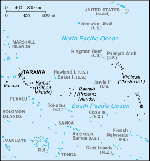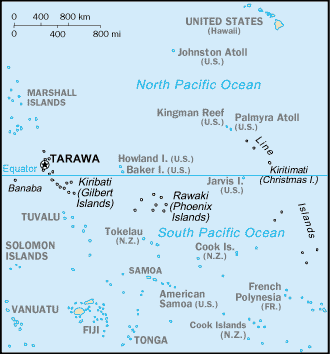 Kiribati
Kiribati
Country Specific Information
On this page » |
|
April 21, 2009
COUNTRY DESCRIPTION:
 The Republic of Kiribati (pronounced kir-ree-bas) is an island group in the Western Pacific Ocean. It consists of an archipelago
of some 33 low-lying coral atolls surrounded by extensive reefs, with a total land area of 800 square kilometers. Kiribati
gained independence from the United Kingdom in 1979. Kiribati has an elected President and a legislative assembly. The capital
city is Tarawa. Kiribati has few natural resources, and its economy is very small. Tourist facilities are not widely available.
Read the Department of State Background Notes on Kiribati for additional information.
The Republic of Kiribati (pronounced kir-ree-bas) is an island group in the Western Pacific Ocean. It consists of an archipelago
of some 33 low-lying coral atolls surrounded by extensive reefs, with a total land area of 800 square kilometers. Kiribati
gained independence from the United Kingdom in 1979. Kiribati has an elected President and a legislative assembly. The capital
city is Tarawa. Kiribati has few natural resources, and its economy is very small. Tourist facilities are not widely available.
Read the Department of State Background Notes on Kiribati for additional information.
ENTRY/EXIT REQUIREMENTS: A valid passport with a minimum of six months validity until expiration date is required. According to the web site information posted by the Kiribati National Tourism Office of the Ministry of Communication Transport and Tourism Development, U.S. citizens are not required to obtain visas prior to travel to Kiribati. To see this and other information on visas, please go to the Kiribati National Tourism Office web site. For information on long-term visit or residency requirements, please contact the Consulate of the Republic of Kiribati, 95 Nakolo Place, Rm. 265, Honolulu, HI 96819, tel. (808) 834-6775, fax (808) 834-7604, or via e-mail kiribaticonsul@aol.com.
Information about dual nationality and the prevention of international child abduction can be found on our web site. For further information about customs regulations, please read the Customs Information sheet.
SAFETY AND SECURITY: For the latest security information, Americans traveling abroad should regularly monitor the Department of State, Bureau of Consular Affairs’ web site, where the current Travel Warnings and Travel Alerts, as well as the Worldwide Caution, can be found.
Up-to-date information on safety and security can also be obtained by calling 1-888-407-4747 toll-free in the U.S. and Canada, or for overseas callers, a regular toll line at 1-202-501-4444. These numbers are available from 8:00 a.m. to 8:00 p.m. Eastern Time, Monday through Friday (except U.S. federal holidays).
The Department of State urges American citizens to take responsibility for their own personal security while traveling overseas. For general information about appropriate measures travelers can take to protect themselves in an overseas environment, see the Department of State’s A Safe Trip Abroad.
CRIME: Although the crime rate in Kiribati is low, visitors should not be complacent regarding personal safety or the protection
of valuables.
INFORMATION FOR VICTIMS OF CRIME: The loss or theft abroad of a U.S. passport should be reported immediately to the local police and the nearest U.S. embassy or consulate. If you are the victim of a crime while overseas, in addition to reporting to local police, please contact the nearest U.S. embassy or consulate for assistance. The embassy/consulate staff can, for example, assist you to find appropriate medical care, contact family members or friends and explain how funds could be transferred. Although the investigation and prosecution of the crime is solely the responsibility of local authorities, consular officers can help you to understand the local criminal justice process and to find an attorney if needed.
Emergency numbers in Kiribati: The general emergency equivalent to “911” is 999. You can also reach individual emergency services by directly dialing 992 for police, 993 for fire, and 994 for ambulance.
Please see our information on Victims of Crime, including possible victim compensation programs in the United States.
CRIMINAL PENALTIES: While in a foreign country, a U.S. citizen is subject to that country’s laws and regulations, which sometimes differ significantly
from those in the United States and may not afford the protections available to the individual under U.S. law. Penalties for
breaking the law can be more severe than those in the United States for similar offenses. Persons violating Kiribati’s laws,
even unknowingly, may be expelled, arrested, or imprisoned. Penalties for possession or use of, or trafficking in illegal
drugs in Kiribati are severe, and convicted offenders can expect long jail sentences and heavy fines. Engaging in sexual
conduct with children or using or disseminating child pornography in a foreign country is a crime, prosecutable in the United
States. Please see our information on Criminal Penalties.
SPECIAL CIRCUMSTANCES: Customs: Kiribati’s customs authorities strictly prohibit the importation of firearms, ammunition, explosives and indecent publications. Strict quarantine laws govern the import of any part of plants, fruits or vegetables, as well as soil, animals and animal products. Visitors are not allowed to export human remains, artifacts that are 30 or more years old, traditional fighting swords, traditional tools, dancing ornaments or suits of armor. For more information, please contact the Consulate of the Republic of Kiribati in Honolulu, HI.
Please see our Customs Information.
Currency: The Australian dollar is the legal currency in Kiribati. Traveler’s checks and all major currencies are accepted by banks and may also be exchanged for local currency at some local hotels. Visa and MasterCard are accepted at most hotels.
Natural Disaster: Kiribati is located in an area of high seismic activity. Strong winds are common, especially during the cyclone season from November to April. General information about natural disaster preparedness is available from the U.S. Federal Emergency Management Agency (FEMA).
MEDICAL FACILITIES AND HEALTH INFORMATION: Health care facilities in Kiribati are adequate for routine medical care, but extremely limited in availability and quality. Serious medical conditions requiring hospitalization or evacuation to the United States or elsewhere may cost thousands of dollars. All water should be regarded as a potential health risk. Visitors should therefore refrain from drinking any water that is not bottled, boiled or otherwise sterilized. Vegetables should be cooked and fruit should be peeled before it is eaten. There are currently no direct flights from Kiribati to the U.S. and only very limited flights from any of the islands of Kiribati to Fiji. A serious medical condition could require an expensive medical evacuation.
The U.S. Department of State is unaware of any HIV/AIDS entry restrictions for visitors to or foreign residents of Kiribati.
Information on vaccinations and other health precautions, such as safe food and water precautions and insect bite protection, may be obtained from the Centers for Disease Control and Prevention’s hotline for international travelers at 1-877-FYI-TRIP (1-877-394-8747) or via the CDC's website. For information about outbreaks of infectious diseases abroad, consult the World Health Organization's (WHO) website. Further health information for travelers is available from the WHO.
MEDICAL INSURANCE: The Department of State strongly urges Americans to consult with their medical insurance company prior to traveling abroad
to confirm whether their policy applies overseas and whether it will cover emergency expenses such as a medical evacuation.
Please see our information on medical insurance overseas.
TRAFFIC SAFETY AND ROAD CONDITIONS: While in a foreign country, U.S. citizens may encounter road conditions that differ significantly from those in the United States. The information below concerning Kiribati is provided for general reference only, and may not be totally accurate in a particular location or circumstance.
Traffic moves on the left side of the road in Kiribati. Roads in urban Tarawa and Christmas Island, while satisfactory in some areas are generally in need of repair. After heavy rains, some road sections experience temporary flooding. Vehicle traffic proceeds at a relatively slow rate. Drinking and driving is a common practice, especially on the weekends. Since visibility is poor with no streetlights, drivers should be especially careful when driving at night. For specific information concerning Kiribati drivers’ permits, vehicle inspection, road tax and mandatory insurance, please contact the Consulate of the Republic of Kiribati in Honolulu, HI.
Please refer to our Road Safety page for more information.
AVIATION SAFETY OVERSIGHT: The U.S. Federal Aviation Administration (FAA) has assessed the Government of Kiribati’s Civil Aviation Authority as not being in compliance with International Civil Aviation Organization (ICAO) aviation safety standards for oversight of Kiribati’s air carrier operations. Further information may be found on the FAA’s website.
CHILDREN'S ISSUES: For information see our Office of Children’s Issues web pages on intercountry adoption and international parental child abduction.
REGISTRATION / EMBASSY LOCATION: There is no U.S. Embassy in Kiribati. Americans living or traveling to Kiribati are encouraged to register with the U.S. Embassy in Suva, Fiji, or through the State Department’s travel registration website, and to obtain up-to-date information on travel and security within Kiribati. By registering, American citizens make it easier for the Embassy to contact them in case of emergency. The U.S. Embassy in Fiji is located at 31 Loftus Street in the capital city of Suva; telephone (679) 331-4 466; fax (679) 330-2 267. Information may also be obtained by visiting the Embassy Suva homepage.
* * *
This replaces the Country Specific Information for Kiribati dated July 9, 2008 to update the sections on Information for Victims of Crime, Medical Facilities and Health Information, and Special Circumstances.

